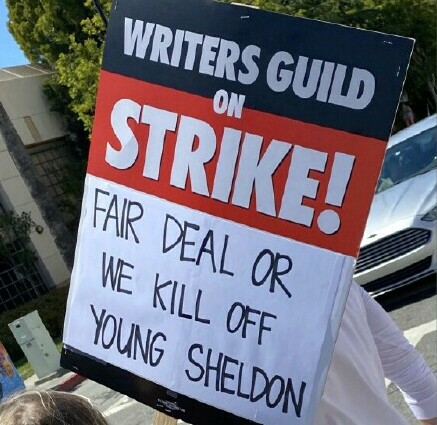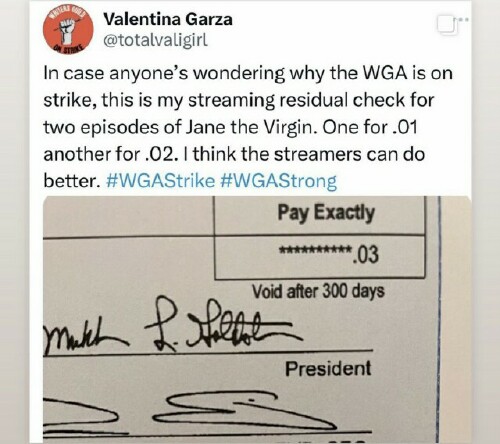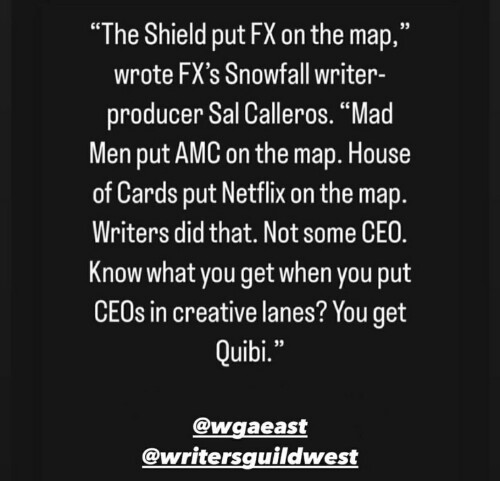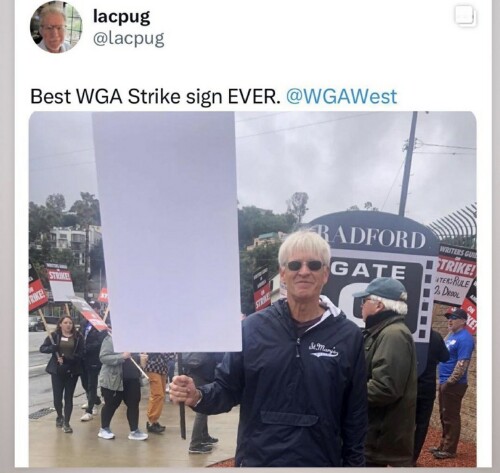WGA Protest -- The Strike Is Right

Sometimes it's difficult to feel sorry for TV writers. Even during the ongoing era of Peak TV, much of their work has been unremarkable at best. For every Ghosts, Abbott Elementary, Yellowjackets or Succession we get more duds than we can recall. Those failures are not always the fault of the writers, but the timeless phrase "if it ain't on the page, it ain't on the stage" is always top of mind. How often have you watched episodes of a terrible television program and wondered how it got through the development pipeline, or how much time was spent in a writers' room "perfecting" it, or how much the writers were paid for that?
Indeed, that'sthe thing … when they are working (which is not all the time) TV writers make significant money … in many cases much more than most of us. They also enjoy varying degrees of creative fulfillment, enviable job satisfaction and, on occasion, much critical praise. But as challenging as it can be to sympathize with them, support them we must, because despite the comparatively grand privileges they enjoy when everything goes their way, right now they are fighting the good fight … and I would argue they are representing us all.
Money is at the heart of this matter, as it is with almost everything that matters. What the writers want is no different than what everyone else wants (and so few ever receive) -- a fair share of the profits, or whatever financial success their work achieves, before it lands in the pockets of CEOs and other senior executives who in entertainment as in most businesses are siphoning the spoils into their own pockets via outsize salaries and even more outrageous bonuses. Just consider this message, which has been highly visible on social media since the strike began.

This same runaway corporate greed is destroying industries that are much more important than entertainment, such as health care and education. Read this to fully understand the writers' point of view.
The collective insanity of our basic economic structure is overwhelming and seemingly unchangeable. In that context, it's great to see members of the WGA on strike and receiving so much high-profile support from the actors and other creatives to whose fortunes they have contributed. Tellingly, it appears that members of the Directors Guild and SAG/AFTRA are right behind them, preparing to strike as well and do their part to make essential changes within the industry they love. But, as Jack Myers writes in his most recent column, "The second golden age of quality television is waning. The chess game being played by the WGA and studios has many moves ahead. For the WGA, the reality is that content is no longer king or queen. I expect WGA members, sadly, may now be pawns."
I fear he is correct. The decks in May 2023 are stacked against the creative community in ways we couldn't have predicted back in November 2007, when the previous WGA strike began. For instance, there is currently more product (foreign and domestic) on almost any streaming service you care to name than any sane person could hope to watch during the next ten years. (I know people who only watch YouTube. Clips, videos, old shows, what have you. Heck, give me Tubi and Pluto and I'm good to go for a very long time.)

Add to that the surge of news and reality programming during the last 15 years, and the truth is clear: If the strike brings about a prolonged work shortage there will be plenty to entertain us. (It's almost like the COVID lockdown all over again. Would Tiger King have emerged as a cultural phenomenon without a pandemic to keep us all at home? I rather doubt it. But I'm not totally cynical about this; I'm certain that Squid Game would have been the smash that it was regardless of when it premiered.)
And then there is the unchecked growth of social media -- content made by millions that entrances millions more. The output is so high and the bar so low that anyone can call themselves a writer -- excuse me, a content creator. That's surely not good news for TV writers and other media creatives (including journalists) who take content creation seriously and have worked and studied and sacrificed to get where they are, only to be pummeled on a daily basis by the fearsome forces of digital life (including, now, the looming threat of AI).

I'm as guilty as anyone else of sitting down at night to watch the work of TV and movie writers only to end up engaged by the work of those who do not write (influencers, TikTokkers, Instagrammers, etc.) I instinctively reach for my phone, ostensibly to check my messages, only to fall into one social media rabbit hole or another. And just like that … the evening is over.
Interestingly, while the proliferation of social media content could work against the writers who are protesting, it may also turn out to be their best friend. During the first week of the strike there has been no better coverage of the WGA picket lines and the messaging of the protesters than that created by the writers themselves on their social media accounts. Said messaging is clear, concise, at times infuriating and often quite funny -- especially the photos they are posting (like the three included in this column) that instantly go viral.
I would call this a cliffhanger … but the real drama is yet to come.
Click the social buttons to share this content with your friends and colleagues.
The opinions and points of view expressed in this content are exclusively the views of the author and/or subject(s) and do not necessarily represent the views of MediaVillage.com/MyersBizNet, Inc. management or associated writers.


